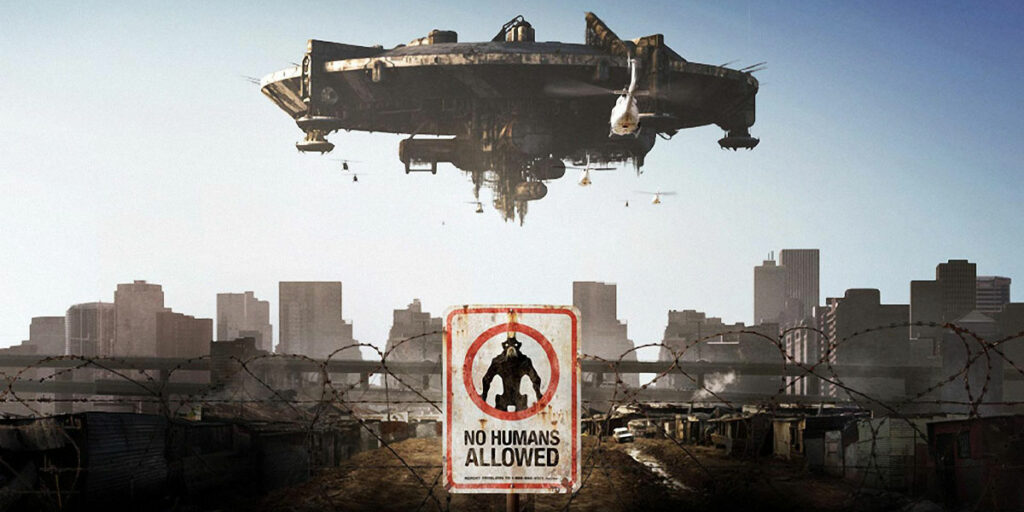District 9 reminds us why it’s a modern classic with a blend of visual achievement and sharp social commentary.
I’m going to add an important caveat right here in my introduction: this review is going to get political. I try to avoid expressing my own views in my reviews if I can help it, but that hasn’t stopped me from hinting at them in the past. District 9 is an overtly political movie, and it would be really difficult to talk about it without mentioning its political element. So if the movie I’m reviewing isn’t going to be bipartisan, neither am I. If that kind of thing bothers you, you’ve seen my score: District 9 is great. Now then, let’s get into this review.
I was fourteen years old when District 9 first came out in 2009, and, when my dad and I went to the cinema, we had a choice between that and Inglorious Basterds. We went with the latter, and, though I kept meaning to watch District 9, I just never got around to it until writing this review, eleven years later. Since the film is getting released in 4K Ultra HD on October 19, I figured now was as a good a time as any to give it a watch. Now, this might be odd to say, but I’m glad I waited this long to see it: I was able to go into it with fresh eyes and without any expectations or half-memories from past viewings. Let me tell you, given the backdrop of, you know, EVERYTHING, and, despite being over a decade old, District 9 resonates more in 2020 than other films that have came out this year.
District 9 follows Wikus Van De Merwe (Sharlto Copley), a South African government agent tasked with the relocation of a community of extraterrestrials who are forced to live in a massive slum. While serving eviction notices, Wilkus has an accident that begins to change his body, causing him to be targeted by his own government agency, and allows him to see life through the aliens’ eyes.

First of all, this film holds up visually. The cinematography is really well done: there are sections meant to look like news reports or found footage, but it never devolves into shaky-cam, so it gets the desired effect without making you motion sick. The makeup and practical effects are top notch: there is some seriously impressive prosthetic work, and it makes for a bodily transformation that looks unbelievably unpleasant (but, like, in a good way). Not to mention the CGI, which holds up surprisingly well. I mean, not all of it looks amazing, but it’s still done well enough that it looks better than most of its contemporaries, and even a lot of films that have come out in the last few years. Seriously, the craft of this film is masterful, and it would get a recommendation from me based on its technical aspects alone.
Hey, remember that whole politics talk I gave at the beginning of this review? Well, buckle up, because we’re going to dive into that now. The science fiction genre is not a stranger to indirect representation and social commentary: Godzilla (1954) was an allegory for the dangers of nuclear war. Robocop (1987) was a warning of how the mass privatization of government and municipal programs will lead to the decimation of social safety nets. They Live! (1988) was a vehicle for John Carpenter to rail against the Reagan administration for two glorious hours.
District 9 continues this tradition by addressing a prevalent issue in 2009 that has only become more relevant in 2020: the treatment of immigrants and minorities at the hands of the powerful. First of all, instead of “illegal aliens,” we have literal aliens who come to Earth malnourished and desperate after their ship malfunctions. They’re forced into a massive slum and face discrimination from all of the humans in Johanasburg (“Prawns” is a common slur used to refer to the aliens throughout the movie). We see how government officials disregard the lives of others in the name of profiteering from arms dealing, and we watch as Wikus’ government agency kills the aliens with impunity over minor infractions, often with smiles on their faces. You can understand how seeing people in positions of power murder minorities is harrowing, given the current political climate in my home country of the United States.
It also addresses how governments target dissenters who reveal their atrocities, ruining their lives and framing them as evil people. It shows how a government may use the media to frame their dissidents as monsters. Wikus gets first hand experience of what it is like to live as an alien, and is quickly targeted by the government agency he works for, who immediately raid his home, arrest his work associate, tap his phone calls with his wife, and send paramilitary squads to abduct him. I think this movie is prophetic, and reminded me of how the US treated some of its own whistleblowers: District 9 came out before Chelsea Manning and Edward Snowden leaked some of the US government’s illegal activities. As of writing this, Manning has just been released from prison but faces a fine of over $250,000, and Snowden is still in Russia unable to return to the United States without facing criminal charges.
District 9 may be turning eleven this year, but watching it was a sobering reminder of what is happening outside of my sphere of comfort. It’s an extremely well-made film, and, while parts of it are sensationalized in a manner consistent with how I would want a science fiction film sensationalized, it addresses its social aspect effectively. I wish I could tell you that these were products of fiction and that, once the credits roll, we can remove what we witnessed from our minds. But I can’t. Right now, we have our own immigration and racial prejudice crises, and not just in South Africa or in the USA. District 9 is an outstanding movie, but it also presents a challenge to its viewers: what will you do when you see someone different than you being mistreated?
District 9 is now available to watch on digital and on demand.

